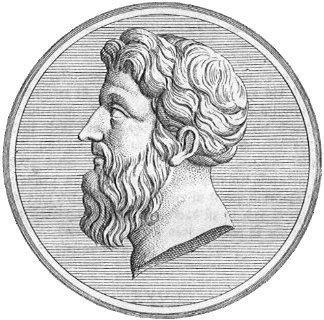Chilon brought greater strictness to Spartan training. As an ephor (c.556 B.C.) he strengthened the power of that position, and he introduced the custom of joining the ephors to the kings as their counselors, though Satyrus attributes this institution to Lycurgus.
The ephors (Ἔφορος) were leaders--overseers--of ancient Sparta who shared political power with the Spartan kings. Five ephors were elected annually, who 'swore on behalf of the city', while the kings swore for themselves. The institution may have arisen from the need for governors while the kings were leading armies in battle. The ephors were elected by the popular assembly, and all citizens were eligible for election. They were forbidden to be reelected. The ephors provided a balance for the two kings, who rarely cooperated with each other.
It is recorded that he composed verses in elegiac metre to the number of two hundred, which also included many of his ethical and philosophical sayings which were eventually recorded by Diogenes Laertius. His poetry has been lost to time.
"Honor old age."
"Prefer punishment to disgraceful gain; for the one is painful but once, but the other for one's whole life."
"Do not laugh at a person in misfortune."
"If one is strong be also merciful, so that one's neighbors may respect one rather than fear one."
"Learn how to regulate one's own house well."
"Do not let one's tongue outrun one's sense."
"Restrain anger."
"Do not dislike divination."
"Do not desire what is impossible."
"Do not make too much haste on one's road."
"Obey the laws."
Chilon is also credited with the change in Spartan policy leading to the development of the Peloponnesian League in the sixth century BC.The Peloponnesian League was an alliance in the Peloponnesus from the 6th to the 4th centuries BC. It is known mainly for being one of the two rivals in the Peloponnesian War (431–404 BC).
By the end of the 7th century BC Sparta had become the most powerful city-state in the Peloponnese and Sparta continued to aggressively use a combination of foreign policy and military intervention to gain other allies, which eventually included all Peloponnesian states except Argos and Achaea. This was the Peloponnesian League.
Legend says that he died of joy in the arms of his son, who had just won a prize for boxing at the Olympic games, and that his funeral was attended by all the Greeks assembled at the festival.

No comments:
Post a Comment